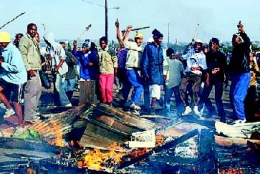Last year’s wave of xenophobic attacks against African immigrants in townships across South Africa marked a time when the dark days of discrimination seemed to have caught up with the present.
The attacks shocked the whole continent – a shock made stronger by the fact that these were acts of prejudice on the part of people who were only so recently discriminated against themselves.
On 12 May 2008, a series of riots broke out in the township of Alexandra, north of Johannesburg, when locals attacked migrants from Mozambique, Malawi and Zimbabwe, killing two people and injuring 40 others.
In the following weeks the violence spread, first to other settlements in the Gauteng province, then to the coastal cities of Durban and Cape Town. But the question remains: why did it happen?
Nigerian native Dennis Osula lived in South Africa for 13 years before coming to Ireland two-and-a-half years ago, and believes the resentment behind these attacks had been festering for some time.
“South African people don’t believe in work,” he says controversially. “When foreigners came to South Africa and established their businesses, they were progressing and were successful. So South Africans became jealous and chased people around.”
Independent politician Patrick Maphoso may not share Osula’s negativity, but he still despairs at last year’s developments.
“This discrimination upsets me so much. I apologise for all the communities who were discriminated,” says the South African, who ran for election in Dublin’s North Inner City ward last month.
Maphoso believes the government under former President Thabo Mbeki should have reacted more strongly to the discontent and violence
“We can blame the government for not flinging their muscles. The government could have stopped this behaviour three or four years ago already. This problem should have been sorted out long ago.”
Now that Jacob Zuma has assumed the presidency, Maphoso expects a different approach: “I hope Zuma will do something. I hope he will reassure his responsibility. He should be able to enforce better control.”
Osula, too, has faith that President Zuma will make a difference. “Zuma had already started to make a change before he became president. He has been to all rural areas and explained to the people that educated people should not be chased away from the country.”
Aside from the government’s new proactive attitude, Maphoso believes the country also needs some international intervention. He even intends to contribute himself to stop any further xenophobic pogroms. He regards communication as the key to change.
“I don’t think South African people would be happy if their own people would be treated like that,” he explains.
Maphoso especially wants to help to solve the ongoing problems between South African and foreign-owned businesses.
“We have to get to the bottom and meet the local business people. This problem has to be investigated further. I think through dialog we get both sides together.”












